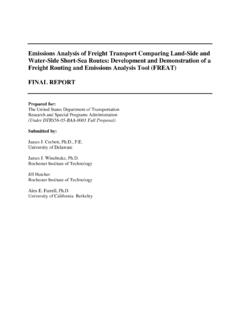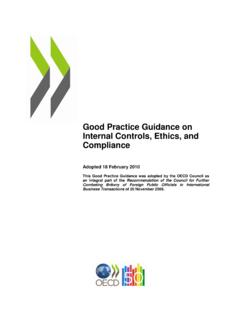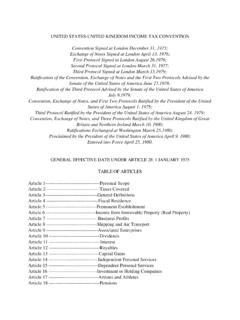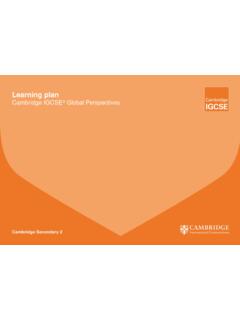Transcription of Role of the Legislature Chapter 1 in the Budget Process: …
1 ISSN 1608-7143. OECD Journal on Budgeting Volume 7 No. 3. OECD 2007. Role of the Legislature in the Budget Process: Chapter 1. Recent Trends and Innovations by Paul Posner and Chung-Keun Park*. This article provides a broad historical and conceptual overview of the evolution of legislative roles in budgeting, and assesses the potential consequences of expanded roles. By analysing country Budget institutions and practices, the article proposes ways to establish sound relationships between the executive and legislative branches of government. * Professor Paul Posner is the Director of the Masters in Public Administration Program at George Mason University, Virginia, United States, and former Managing Director of the United States Government Accountability Office.
2 Chung-Keun Park is a Project Manager in the Budgeting and Public Expenditures Division of the Public Governance and Territorial Development Directorate, OECD. 1. ROLE OF THE Legislature IN THE Budget PROCESS: RECENT TRENDS AND INNOVATIONS. 1. Introduction The two most important players in the Budget process are the Legislature and the executive Budget office. Their respective role and power in the Budget process differ from country to country and are influenced by many factors, including the wider historical, constitutional and political context as well as the legal and procedural aspects of the Budget process itself and internal legislative structures and processes.
3 The constitutional division of power between executive and legislative branches ranges from presidential systems of separation of powers, such as in the United States, where the Legislature has a strong role, to Westminster parliamentary systems, where the executive generally dominates. In between are modified forms including semi-presidential systems and non-Westminster parliamentary systems. During the 20th century, the size and complexity of government grew exponentially in OECD countries, along with a greater focus on international issues and conflict affairs.
4 In some countries, these trends promoted greater influence by the executive in budgeting. In recent years, however, executive roles have been challenged, as legislatures in certain countries have asserted new roles and responsibilities in budgeting. This trend is driven by many different factors, including the increased political stress on fiscal policy because of fiscal constraints and changes in the composition and cohesiveness of parties and party systems. Even in the United Kingdom, the core Westminster parliamentary system, new measures were introduced in the 1990s to support the Legislature 's efforts to more effectively control public expenditure.
5 The need to respond to current fiscal problems and future fiscal risks arising from ageing populations as well as performance management and Budget reforms will continue to challenge both executive and legislative officials to adapt and strengthen their roles in the Budget process. As budgeting becomes more relevant for a wider range of policy and management challenges, officials throughout government will increasingly focus on how they can influence these choices by repositioning their roles in Budget formulation, execution and oversight. Given the recent changes in this area, OECD member countries at the 2006.
6 Annual Senior Budget Officials meeting requested that the OECD secretariat conduct an in-depth study on this topic. For this purpose, a meeting was held in Paris in October 2006, with delegates from nine countries1 representative of four different forms of government: presidential, semi-presidential, Westminster 2 OECD JOURNAL ON BUDGETING VOLUME 7 No. 3 ISSN 1608-7143 OECD 2007. ROLE OF THE Legislature IN THE Budget PROCESS: RECENT TRENDS AND INNOVATIONS. parliamentary, non-Westminster parliamentary. This article draws on the presentations and discussions at that meeting and on previous OECD work in this area (Lienert and Jung, 2004).
7 While it provides a theoretical background, the article focuses on the practical aspects of what the two players actually do in the Budget process. By analysing each country's Budget institutions and practices, this article highlights policy suggestions for developing co-operation and establishing sound relationships between the two branches of government. This article provides a broad historical and conceptual overview of the evolution of legislative roles in budgeting, and assesses the potential consequences of expanded legislative roles. The article also contains a review of the relationship between the two branches and some policy suggestions to enhance executive-legislative co-operation in budgeting.
8 The article draws on the experiences of the nine countries that participated in the OECD meeting, highlighting the practices and procedures that are followed by the Legislature and the executive during the Budget formulation and execution cycle. 2. Legislatures and budgeting The historical and institutional background The legislative role in budgeting has evolved over centuries. In England, the ascendancy of the Legislature as a political and fiscal institution was integral to the shift from a monarchy to a democracy. Other countries have had similar experience.
9 The independent exercise of the power of the purse was a primary anchor of the Legislature 's emerging role in the governance process. Determining the allocation of resources among competing claims was critical to establishing the legitimacy and authority of the Legislature as an institution competing with the monarchy. Over time, the Legislature 's authority to appropriate public funds became the foundation for public budgeting and accountability, preceding the development of budgets by the executive. The fundamental power of appropriation gave the Legislature formative influence in allocating funds among competing priorities.
10 Legislatures went beyond this ex ante role to assume ex post influence over the process of Budget execution and programme administration. Agencies were typically bound to follow the levels in detailed appropriation accounts in order to spend funds during the course of the year. Legislative influence over executive agencies was further reinforced by the exercise of oversight over agencies'. management and Budget implementation, either directly or through independent audit offices. The roles currently exercised by legislatures actually range widely. The major influences include broader political, legal and institutional forces OECD JOURNAL ON BUDGETING VOLUME 7 No.

















